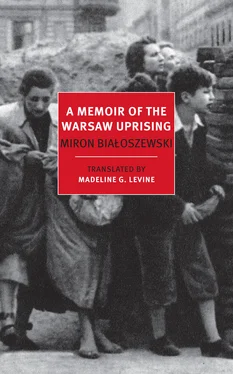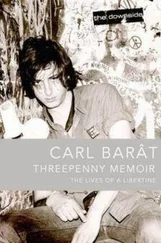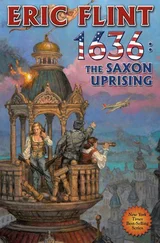Miron Bialoszewski - A Memoir of the Warsaw Uprising
Здесь есть возможность читать онлайн «Miron Bialoszewski - A Memoir of the Warsaw Uprising» весь текст электронной книги совершенно бесплатно (целиком полную версию без сокращений). В некоторых случаях можно слушать аудио, скачать через торрент в формате fb2 и присутствует краткое содержание. Год выпуска: 2015, Издательство: NYRB Classics, Жанр: Биографии и Мемуары, на английском языке. Описание произведения, (предисловие) а так же отзывы посетителей доступны на портале библиотеки ЛибКат.
- Название:A Memoir of the Warsaw Uprising
- Автор:
- Издательство:NYRB Classics
- Жанр:
- Год:2015
- ISBN:нет данных
- Рейтинг книги:4 / 5. Голосов: 1
-
Избранное:Добавить в избранное
- Отзывы:
-
Ваша оценка:
- 80
- 1
- 2
- 3
- 4
- 5
A Memoir of the Warsaw Uprising: краткое содержание, описание и аннотация
Предлагаем к чтению аннотацию, описание, краткое содержание или предисловие (зависит от того, что написал сам автор книги «A Memoir of the Warsaw Uprising»). Если вы не нашли необходимую информацию о книге — напишите в комментариях, мы постараемся отыскать её.
A Memoir of the Warsaw Uprising — читать онлайн бесплатно полную книгу (весь текст) целиком
Ниже представлен текст книги, разбитый по страницам. Система сохранения места последней прочитанной страницы, позволяет с удобством читать онлайн бесплатно книгу «A Memoir of the Warsaw Uprising», без необходимости каждый раз заново искать на чём Вы остановились. Поставьте закладку, и сможете в любой момент перейти на страницу, на которой закончили чтение.
Интервал:
Закладка:
The fifth day, Saturday, August 5. A lot of prolonged roaring. I run out to the gate.
“The Wache is taken!” I race upstairs. With that joyous news. To Irena and Staszek. Chłodna was free. A minute later all decked in flags. In a moment crowds poured into the street. To make barricades. Everyone. Women. Old men. I remember. Salesladies in white aprons. And an older woman who was quickly passing me bricks with one hand because she was holding her pocketbook in the other. I passed the bricks to a salesgirl in her white apron. And so on.
People were shouting, “Faster! Faster!” The bricks were collected from the blown-up buildings on the corner of Waliców. Suddenly, we hear airplanes. We run to the steps of a Secession-style apartment house at number 20 or 22.[2] Bombs. We run down to the cellar. It was the house of Pan Henneberg, I think, an engineer, one of the Henneberg brothers and the father of my three schoolmates and scouting friends. I used to visit there before the war. I remember that whenever I visited them in those days the house was full of people, the door to the balcony was open and there was a terrific noise from the street, as if people were actually riding through the apartment. This morning or the day before, Pan Henneberg had climbed the tram mast and cut the wires and then thrown them down so that the tanks would get all tangled up in them, and he’d cursed at the Germans, out loud. Not long ago, just this year in fact, I read in the weekly The Capital that one of the younger Henneberg brothers, one of my schoolmates, that is, had died in the uprising. The other one also perished. I remember their mother from my school days, when she was in mourning; she had very blond hair. We could hear the tanks. They were on the way already. All or nothing. We had to escape.
In the cellar in this building there was one elderly gentleman. He had come there.
“Where did you come from?” I asked him.
“From Krakowskie Przedmieście.”
He described how the Germans were arresting people and herding them in front of the tanks against the partisans, so that the partisans would shoot them.
“And the whole street has been burned down…”
“Which street?” I asked.
“Krakowskie Przedmieście, of course,” he said very sadly.
I remember that I was surprised then, first of all at hearing someone call Krakowskie Przedmieście a street rather than an avenue and second that the old man was so terribly upset about it. I am not surprised now.
After the bombardment we went outside. They were calling for help at the next barricade right before Żelazna Street. Men were needed. I ran over. They handed out picks and crowbars. For the cobblestones and sidewalks. Anyway, part of the trench was already dug up. I saw for the first time what a tangle of pipes and conduits there is underground. They warned us to dig carefully. On the fourth corner of Żelazna a cigarette kiosk was overturned as a barrier, the cigarettes spilling out. Some guy started picking them up.
“Hey, mister, at such a time!” And other people also began yelling at him. He was embarrassed, stopped, went on digging with us. Suddenly people are wheeling out the corpses of those Germans from the Wache. In wheelbarrows. Stripped to the waist. Barefoot. The green soles of their boots sticking out. Bare soles. And I remember the belly of one or was it two Germans protruding from the wheelbarrows. There were several of them in each wheelbarrow. They are to be buried. On the square in front of the Church of St. Boromeusz. Don’t make a cross. But start over and mark out a circle of dirt (which later, more or less at dusk, I saw they did). They take me to help out.
I am ashamed to refuse. But I wish for an air raid right at that moment, so that others will have to do it instead of me. And there is one. Quickly, ever so quickly. They fly over. And bombs! So that the men with the wheelbarrows drop the wheelbarrows, the German corpses sail into the trenches, into the excavations, strike the pipes, the cables, and remain somewhere deep down there. With the result that some people dug them out immediately, but by then it was other people. After the bombs. I fled for all I was worth two apartment houses away.
Then the return to Irena. We decided to separate. Because we really had to go back to our mothers. Irena remained here, in her own house. I was supposed to go back to my house, to 4 °Chłodna. Staszek to his. To 17 Sienna Street. But people were running from that direction and screaming, “Pańska’s bombed! Prosta’s bombed!”
We say goodbye between Waliców and Żelazna. I run toward Żelazna. A lot of people, objects, destruction, changes, commotion. A crowd. Flight. The pigeon fanciers. I remember. I see: a line of what looks like Boy Scouts in green uniforms making their way from Chłodna Street to Żelazna near the arcades in those various blind alleys. They’re holding bottles of gasoline. They turn into Żelazna. The weather’s fine. Saturday. Sunny. I rush into our house. Mama’s there. And besides Mama:
“Babu Stefa!” because she really was sitting there in an armchair. In the living room. Just like that. I called her Babu Stefa because I was reading Rabindranath Tagore then, in which Panu Babu is a character. Stefa, a Jew, was our boarder until the spring of 1944. Half family. Before that she’d lived with my father’s second wife (common law, Zocha), at 32 Chmielna Street, with Zocha, my father, and Halina. I don’t know if there were some other reasons or if they simply had quarreled, but one day in 1942, after we’d gotten hold of this apartment on Chłodna Street which had belonged to Jews, because up to that time the ghetto was here, the wall of the ghetto crossed Chłodna between Wronia and Towarowa Streets, they’d constricted the ghetto slightly, they were always constricting the ghetto, so that a number of apartments were vacant, and Father arranged to get this one, 4 °Chłodna, and it was not that these apartments were destroyed so much as that they had a certain peculiar appearance: in the middle of our kitchen there were dried-up feces, obviously human, and Stefa made herself at home right there in the kitchen, concealing herself behind a green half curtain as soon as someone came to see us, although she often showed herself later on because she knew several of our friends and relatives, trusted them, and anyway very little was known about her.
So I cry out, “Where did you come from?!” and we are delighted, we greet each other, shout in amazement, what a coincidence! Probably I was more excited than she. “Babu Stefa, is it possible… are you really here?”
“Oh!”
The armchair in which Stefa was sitting also belonged to a Jew, not from this building but from an apartment house that I think is standing to this day, either it was never damaged or it was rebuilt, in a blind alley, literally blind, which led from Żelazna Street right into Chłodna on the left side, the side nearer the Vistula. They were holding an auction there. Of Jewish furniture. Father rushed into our house. He shouted at me to follow him. Swen happened to be there, so he rushed out to keep me company. Although I didn’t want to go. There. But it was hard to say no because of Father. The gate of this apartment house where the Jewish auction was being held was filled with a heap of junk. Rubbish. A racket. Human. Father grabbed a number of chairs, each one from a different village so that each had its own weight and size, and off they all went to 4 °Chłodna Street. And so in 1942 first of all Father brought Stefa from 32 Chmielna straight to us, supposedly for one night, for two, and so she stayed on for two years. He made up documents for her in the name of Zosia Romanowska. Because Zosia Romanowska had gone to Grochów to see her sister and brother-in-law on September 8, 1939, and she’d taken along her sister-in-law Nora — only to have the door there slam closed on them so that they couldn’t work their keys to get it open, and when the planes flew over, before anything could be done, they had already fallen through to the cellar and only one person survived, Hanka (up above and under the ruins), Zosia’s other sister-in-law who was holding by the hand her neighbor’s little daughter, already dead, and she herself was buried alive in the ruins, and when later she lived next to us on Leszno Street with Nanka (when we had already lost the apartment in Śródmieście), that is, when she was living in the room that had been Zosia’s, she was afraid, I know, to cover herself to the neck with her quilt. Because as she lost her awareness of the quilt it became confused in her mind with rubble that was up to her neck. So Stefa had identity papers in Zosia’s name; a little older than she, but in any case Stefa’s hair was bleached, not really red but sort of a ginger color, resembling a Jewish woman more or less, so it was fortunate that the Germans weren’t aware of these things and our thugs weren’t either, and even more fortunate that Stefa had great courage and a saving self-assurance; when she saw Germans on the road — for she walked along various roads from Służewiec down to Wilanów or Augustówka with her so-called petty wares, very petty, safety pins, Czech jewelry, in order to have something to live on and a bit of money to spare — well, when she saw Germans she approached them herself and asked, “ Wie spät ist?” and she always came back by tram on the “ Nur für Deutsche” platform; once when she met me in the city and we were going to go home together, she said, “Why don’t you ride with me; I’ll teach you a lesson.” And actually, not only did she get on at the “ Nur für Deutsche” platform but she shoved her way to the front end of the car which was separated from the rest of the car and the crowd by a chain (it was empty here); I followed her, standing there rather stupidly and she sat down and began arguing with a Volksdeutscher woman, who, she said, was crowding her.
Читать дальшеИнтервал:
Закладка:
Похожие книги на «A Memoir of the Warsaw Uprising»
Представляем Вашему вниманию похожие книги на «A Memoir of the Warsaw Uprising» списком для выбора. Мы отобрали схожую по названию и смыслу литературу в надежде предоставить читателям больше вариантов отыскать новые, интересные, ещё непрочитанные произведения.
Обсуждение, отзывы о книге «A Memoir of the Warsaw Uprising» и просто собственные мнения читателей. Оставьте ваши комментарии, напишите, что Вы думаете о произведении, его смысле или главных героях. Укажите что конкретно понравилось, а что нет, и почему Вы так считаете.












